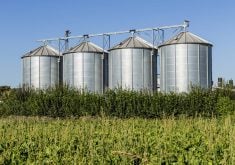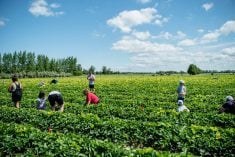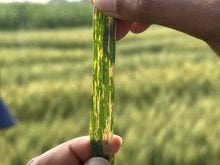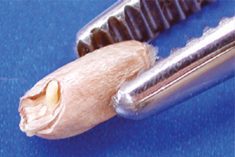For farm writers who value their safety, there are usually two cardinal rules — don’t print anything bad about any breed of cattle, and don’t put good news on the front page (you get calls saying that we shouldn’t give the impression that farmers have lots of money).
For Manitoba farm writers however, there is an even more important rule — don’t express any opinions on drainage. This is because everyone out there is more expert than you, especially on ways to get water off their land and send it somewhere else, and especially when it’s right now.
Read Also

Manitoba canola embattled by verticillium
Verticillium stripe pressure has been growing in Manitoba, and canola farmers still have precious few tools to protect their crop from the disease.
That said, perhaps it’s time to be bold and express the view that there has been a “tipping point” reached on the drainage issue. It comes down to this: just about everyone in the province is now living “somewhere else” — in other words, drainage is causing flooding for more people than it’s helping.
That realization no doubt prompted the provincial Progressive Conservatives to on July 30 call for a moratorium on drainage in Saskatchewan and Manitoba. Water Resources Critic Shannon Martin said he had asked “the province to engage our counterparts in Saskatchewan to have a moratorium on the issuance of new drainage until such time that a more co-ordinated approach is taken.”
Martin added it would be unfair to ask our neighbours to address drainage without making changes here at home.
“We’d have to look at applying it here as well, obviously we can’t simply ask Saskatchewan to bear the burden,” he said.
The rookie MLA quickly learned the lesson that when it comes to drainage, you make such reasonable statements at your peril. Word soon got out, and he was quickly slapped down. Within 24 hours he claimed he had “misspoke,” and in an email said that “the moratorium on all new drainage was exclusive to landowners in Saskatchewan.”
Our sympathies to Mr. Martin, whose party put him in a laughable position. He represents the constituency of Morris, which without some of the world’s most extensive drainage works outside of the Netherlands, would consist largely of cattails and willow clumps. If Manitoba wants Saskatchewan to take us seriously, our position is that it has to stop but we don’t?
A few days later, the PCs tried to deflect attention with a press release calling for the Alternative Land Use Services (ALUS) programs to be implemented province-wide. ALUS, which was partly developed by now-PC MLA and former KAP president Ian Wishart, would pay farmers to maintain wetlands and other natural areas.
The release contains this quote from Bob Grant, provincial operations manager for Ducks Unlimited.
“The timeliest action we can take to protect our lakes and rivers from nutrient pollution and reduce the threat and impact of flooding is to stop the bleeding by protecting our remaining wetlands from destruction and degradation. Restoring previously drained wetlands begins the healing process immediately. It is remarkable how quickly a restored wetland will recover and behave once again as a functioning ecological system.”
The release goes on to say, “The PCs are committed to making ALUS a component of its long-term flood mitigation and environmental strategy including matching provincial dollars to move ALUS from regional project stage to province-wide implementation.”
Read those paragraphs again, as they are now the official PC position. And contrary to what Mr. Martin “misspoke,” it not only calls for a moratorium on drainage, but restoration of previously drained wetlands. Notably, that is a stronger position than that adopted by the NDP with its recent surface-water management policy.
The point here is not which is better. The issue is that the province and some rural municipalities are being driven to the financial brink by the cost of fighting floods. Drainage, much of which so far has been uncontrolled, is a significant contributor to that cost, and it must be curtailed if not reversed.
There was a time when a politician could not say that without incurring the wrath of the whole farm community. Again, we’ve reached a tipping point. There may now be as many farmers who are being harmed as are being helped by drainage. Some of those affected by changes may pick up the phone and complain, but that is no longer a reason for any politician to run for cover on this issue.
And let’s be blunt. The NDP doesn’t have much to lose in rural Manitoba, so it might as well do the right thing. Short of pledging to fill in every ditch in the Red River Valley, the PCs aren’t going to lose any seats in rural Manitoba, so they might as well do — and say — the right thing.
The right thing is to hold more water back on the land.
















